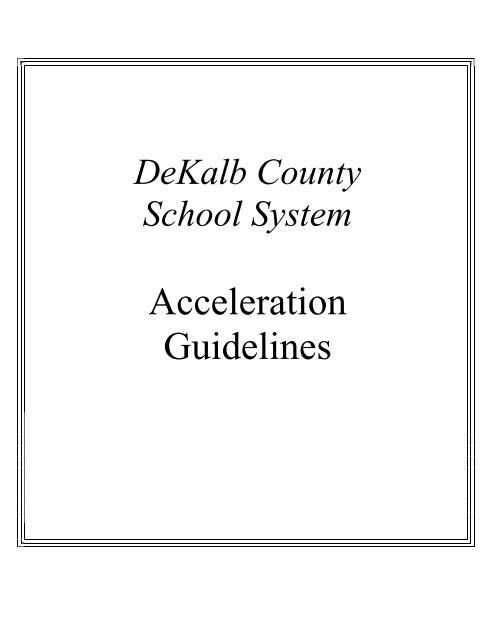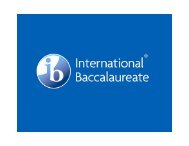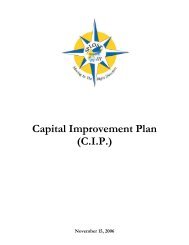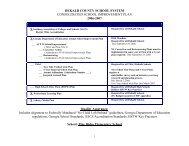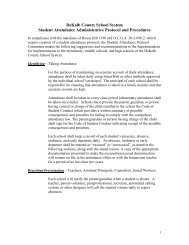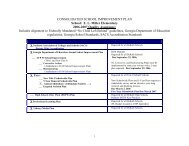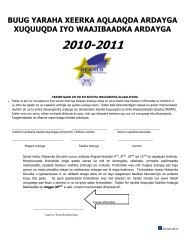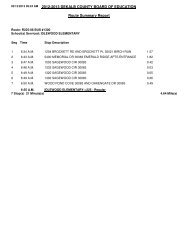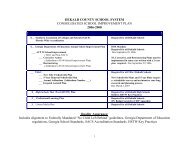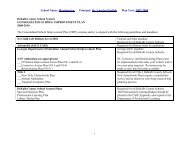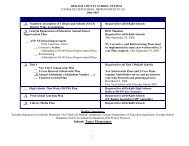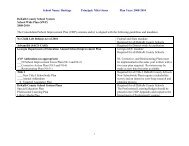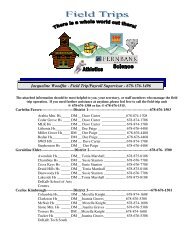Acceleration Guidelines (Elementary) - Dekalb County School System
Acceleration Guidelines (Elementary) - Dekalb County School System
Acceleration Guidelines (Elementary) - Dekalb County School System
You also want an ePaper? Increase the reach of your titles
YUMPU automatically turns print PDFs into web optimized ePapers that Google loves.
DeKalb <strong>County</strong><br />
<strong>School</strong> <strong>System</strong><br />
<strong>Acceleration</strong><br />
<strong>Guidelines</strong>
DeKalb <strong>County</strong> <strong>School</strong> <strong>System</strong><br />
<strong>Acceleration</strong> Committee Members<br />
Sonya Porchér, Chair<br />
Marilyn Steele, Co-Chair<br />
Sherion Armstead<br />
Caroline Croom<br />
Linda Frazer<br />
Mark Gordon<br />
Gail Humble<br />
Brenda Jones<br />
Myra Medlin<br />
Lynn Owings<br />
Jennifer Pittman<br />
Terry Segovis<br />
Gale Thomas<br />
Annette Waller<br />
Kelli Wright<br />
Rita Wyatt<br />
--------------------------------------<br />
Superintendent<br />
Dr. Crawford Lewis<br />
Deputy Superintendent of Curriculum and Instruction<br />
Mrs. Gloria Talley<br />
Board of Education Members<br />
Cassandra Anderson-Littlejohn, Chair<br />
Lynn Cherry Grant, Vice Chair<br />
Elizabeth Andrews<br />
Chuck Burris<br />
Sarah Copelin-Wood<br />
Jesse “Jay” Cunningham, Jr.<br />
Bebe Joyner<br />
Jim Redovian<br />
Zepora Roberts<br />
2
Table of Content<br />
Pages<br />
<strong>Acceleration</strong> <strong>Guidelines</strong> Purpose<br />
4<br />
DeKalb <strong>County</strong> <strong>School</strong> <strong>System</strong> <strong>Acceleration</strong> Choices:<br />
5-10<br />
1. Academic Mentoring 5<br />
2. Curriculum Compacting<br />
5<br />
3. Continuous Progress<br />
6<br />
4. Self-Paced Instruction<br />
7<br />
5. Subject-Matter <strong>Acceleration</strong><br />
7<br />
6. Grade <strong>Acceleration</strong><br />
9<br />
Base Level, Subject-Matter and/or Grade-level <strong>Acceleration</strong><br />
Flow Chart<br />
Recommended Readings<br />
11<br />
12-13<br />
3
Purpose of the <strong>Acceleration</strong> <strong>Guidelines</strong><br />
<strong>Acceleration</strong> choices were developed for elementary schools in the DeKalb <strong>County</strong> <strong>School</strong> <strong>System</strong> to<br />
address the need to provide ability-level acceleration opportunities for students in kindergarten through fifth<br />
grade. The acceleration choices include the following: Academic Mentoring, Curriculum Compacting,<br />
Continuous Progress, Self-Paced Instruction, Subject-Matter <strong>Acceleration</strong>, and Grade <strong>Acceleration</strong>. The<br />
choices are listed from base level acceleration practices to advanced level practices (see below). Kindergarten<br />
students will be eligible for all acceleration choices except grade acceleration.<br />
Base Level <strong>Acceleration</strong> Practices<br />
<strong>Acceleration</strong> Choices<br />
Academic<br />
Mentoring<br />
Curriculum<br />
Compacting<br />
Continuous<br />
Progress<br />
Self-Paced<br />
Instruction<br />
Advanced Level <strong>Acceleration</strong> Practices<br />
Grade<br />
<strong>Acceleration</strong><br />
Subject-<br />
Matter<br />
<strong>Acceleration</strong><br />
The acceleration choices will allow a matching of the level, complexity, and pace of the curriculum with the<br />
student’s readiness and motivation (The Templeton National Report on <strong>Acceleration</strong>, 2004). Determinations<br />
will be made at the local school level regarding the type of acceleration that will benefit the individual student’s<br />
academic needs. <strong>School</strong>s should implement the strategies with the use of a review team when advancing from<br />
the basic acceleration to the more detailed acceleration practices.<br />
For each of the established acceleration choices, the support structures and role/responsibilities of the<br />
support personnel are indicated. The acceleration choices allow a fair and equitable process for student<br />
acceleration based upon teacher, parent, and administrator recommendations as well as performance on<br />
portfolio data, which includes ITBS scores, CogAT scores, Accelerated Reader Level and/or Developmental<br />
Reading Assessment (DRA), Lexile Level, Lexile Score, writing samples, mathematics work samples, and a<br />
reading list. Kindergarten students will need to have completed the Georgia Kindergarten assessment (Windows<br />
1 and 2) as a part of their portfolio. The choices are ranked in order of complexity. The guidelines begin with<br />
teaching strategies and progresses to school-structure implementations.<br />
4
DeKalb <strong>County</strong> <strong>School</strong> <strong>System</strong><br />
<strong>Acceleration</strong> Choices<br />
1. Academic Mentoring<br />
Definition: The student is paired with an academic mentor who provides advanced or more rapid pacing of<br />
instruction.<br />
Support Structures:<br />
1. A teacher mentor, parent mentor, or community member mentor is paired with the student based<br />
upon the regular teacher, counselor, and gifted teacher recommendation or suggested mentor.<br />
2. The mentor will provide a schedule of times with specific goals and objectives for the tutoring to the<br />
teacher and student.<br />
Support Personnel Roles/Responsibilities:<br />
1. The <strong>Acceleration</strong> Review Team will consist of an administrator, the regular education teacher, gifted<br />
teacher, counselor, school psychologist, and special needs teacher (if applicable). The <strong>Acceleration</strong><br />
Review Team will meet to decide if placement with an academic mentor will support the student’s<br />
need for advanced or more rapid pacing of instruction.<br />
2. The school will follow the mentoring procedures as outlined by the counseling department through<br />
Support Services.<br />
3. The mentor will maintain the scheduled meetings with the students and a student portfolio of<br />
projects with the goals and objectives.<br />
4. The school counselor will maintain a list of school mentors and update it annually.<br />
5. The mentor will maintain communication with the regular education teacher and administrative staff<br />
regarding the student’s progress.<br />
6. The regular education teacher will communicate with the parent regarding overall progress with the<br />
mentor.<br />
Considerations: The school counselor shall provide a mentor list and maintain a current list of mentors that can<br />
be paired with students at all grade levels.<br />
2. Curriculum Compacting<br />
Definition: The student’s instruction entails reduced amounts of introductory activities, drill, and practice.<br />
Instructional experiences may also be based on relatively fewer instructional objectives compared to the general<br />
curriculum. The time gained may be used for more advanced content instruction or to participate in enrichment<br />
activities. Instructional goals should be selected on the basis of careful analyses for their roles in the content<br />
and hierarchies of curricula. The pacing of activities and goals should be based on pre-instructional assessment.<br />
Support Structures:<br />
1. The student is provided a listing of standards-based specific assignments.<br />
2. The student is offered a variety of ways to produce an understanding of the content such as through a<br />
product chart (see Recommended Reading page 18).<br />
5
Support Personnel Roles/Responsibilities:<br />
1. The <strong>Acceleration</strong> Review Team will consist of an administrator, the regular education teacher, gifted<br />
teacher, counselor, school psychologist, and special needs teacher (if applicable). The <strong>Acceleration</strong><br />
Review Team will meet to determine if the student’s academic needs will be met through<br />
Curriculum Compacting.<br />
2. In order to effectively provide students with involved curriculum compacting<br />
activities, the teacher will need to participate in strategies training such as a<br />
High Achiever’s Program (HAP) course.<br />
3. The teacher will need to schedule conference times with the student on a<br />
weekly basis to review the progress.<br />
4. The teacher will monitor student progress through the content.<br />
5. The teacher will need to pre and post test the student with each new subject<br />
that is taught or presented.<br />
Considerations: The administrator shall consider the pacing of content, having access to various grade-level<br />
content, and a need for professional/staff development to understand curriculum compacting. Curriculum<br />
compacting will require needed time for implementation.<br />
3. Continuous Progress<br />
Definition: The student is given content progressively as prior content is completed and mastered. The practice<br />
is accelerative when the student’s progress exceeds the performance of chronological peers in rate and level.<br />
Provisions for sequenced materials may or may not be with the discretion of the teacher or within the control of<br />
the student.<br />
Support Structures:<br />
1. A location in the classroom where the student can obtain the materials for his or her continuous<br />
progress involvement.<br />
2. An Evidence of Student Mastery Form is completed by the teacher so that the student will be able to<br />
see the areas he or she is mastering or will need to master (see Student Mastery Form page 13).<br />
Support Personnel Roles/Responsibilities:<br />
1. The <strong>Acceleration</strong> Review Team will consist of an administrator, the regular education teacher, gifted<br />
teacher, counselor, school psychologist, and special needs teacher (if applicable). The <strong>Acceleration</strong><br />
Review Team will meet to determine if continuous progress will meet the student’s academic needs.<br />
2. The teacher will need to schedule conference times with the student on a weekly basis to review the<br />
progress.<br />
3. The teacher will monitor student progress through the content.<br />
4. The teacher will need to pre and post test the student with each new subject that is taught or<br />
presented.<br />
Considerations: The administrator shall consider the time restraints of the teacher in implementing the<br />
Continuous Progress strategy. The implementation of the Continuous Progress strategy requires additional<br />
planning time to develop pacing activities.<br />
6
4. Self-Paced Instruction<br />
Definition: With this option the student proceeds through learning and instructional activities at a self-selected<br />
pace. Self-paced instruction is a sub-type of continuous progress acceleration. Self-paced instruction is<br />
distinguishable from the more general continuous progress in that the student has control over all pacing<br />
decisions.<br />
Support Structures:<br />
1. A location in the classroom where the student can obtain the materials for his or her continuous<br />
progress involvement.<br />
2. A student pacing chart is developed by the student with the assistance of the teacher so that the<br />
student will be able to make determination of the areas he or she is mastering or will need to master<br />
(see Student Mastery Form page 13).<br />
Support Personnel Roles/Responsibilities:<br />
1. The <strong>Acceleration</strong> Review Team will consist of an administrator, the regular education teacher, gifted<br />
teacher, counselor, school psychologist, and special needs teacher (if applicable). The <strong>Acceleration</strong><br />
Review Team will meet to determine if the student’s needs will be met through self-paced<br />
instruction.<br />
2. The teacher will need to schedule conference times with the student on a weekly basis to review the<br />
progress.<br />
3. The teacher will monitor student progress through the content.<br />
4. The teacher will need to pre and post test the student with each new subject that is taught or<br />
presented as the student proceeds through the subjects.<br />
Considerations: The administrator shall consider additional personnel support and professional/staff<br />
development. Access to various content level resources and materials is critical.<br />
5. Subject-Matter <strong>Acceleration</strong><br />
Definition: This practice allows students to be placed with classes with older peers for a part of the day (or with<br />
materials from higher grade placements) in one or more content areas. Subject-matter acceleration or partial<br />
acceleration may be accomplished by the student either physically moving to a high-level class for instruction<br />
(e.g., a second-grade student going to a fifth-grade reading group), or using higher-level curricular or study<br />
materials within their regular classroom. Subject-matter acceleration may also be accomplished outside of the<br />
general instructional schedule (e.g., summer school or after school) or by using higher-level instructional<br />
activities on a continuous progress basis without leaving the placement with chronological-age peers. The<br />
student will be tested on the state assessment in the grade-level where his FTE is earned.<br />
Support Structures:<br />
1. The parent(s)/guardian(s), teachers, or administrators can make a recommendation for subject-matter<br />
acceleration using the <strong>Acceleration</strong> Portfolio Checklist on page 14. Parent contact will need to be<br />
made regarding the decision to gather portfolio information. The parent or guardian will need to<br />
provide a letter to the Assistant Principal of Instruction stating the consent for the student to<br />
participate in the <strong>Acceleration</strong> Review and possible testing.<br />
7
2. The principal will appoint a designee to notify the Director of <strong>Elementary</strong> Instruction, Deputy of<br />
Curriculum and Instruction, and the Area Superintendent of the referral for subject-matter<br />
acceleration review and the outcome of the review.<br />
3. The portfolio data will be gathered on the student, which includes ITBS and CogAT scores. The<br />
student can achieve a score of 96%-99% on the math, reading, or a sub-test portion of the CogAT<br />
and a 99%ile quantitative, verbal, or complete composite on the ITBS. The student’s Accelerated<br />
Reader Level and/or Developmental Reading Assessment (DRA), Lexile Level, Lexile Score,<br />
writing samples, mathematics work sample, and a reading list will need to be placed in a portfolio.<br />
The homeroom teacher will submit an observation form (see Teacher Observation form p. 15). (If<br />
the student performs the indicated scoring on the CogAT and ITBS on individual areas, he or she<br />
may be a candidate for subject-matter acceleration, which is partial acceleration).<br />
3. A trained test administrator will administer the Iowa <strong>Acceleration</strong> Scale to the student. The<br />
recommended range of performance is 60-80 total points. (See Grade <strong>Acceleration</strong>/Subject-Matter<br />
<strong>Acceleration</strong> Flow Chart page 11).<br />
4. The student is allowed to subject-acceleration at any level in the first through fifth grade based upon<br />
the <strong>Acceleration</strong> Review Team recommendations. Decisions to subject-accelerate a student is made<br />
at the end of the semester after all portfolio data is gathered and reviewed. If approved, the student<br />
will be placed in the approved grade.<br />
5. The parent(s) will need to sign the Parent Consent Letter on page 16. The parent, Director of<br />
<strong>Elementary</strong> <strong>School</strong> Instruction, Principal, and Area Assistant Superintendent will need to sign the<br />
Subject-Matter and Grade <strong>Acceleration</strong> Consent and Waiver form on page 17.<br />
Support Personnel Role/Responsibilities:<br />
1. The <strong>Acceleration</strong> Review Team will consist of an administrator, the regular education teacher, gifted<br />
teacher, counselor, school psychologist, and special needs teacher (if applicable). The team will<br />
review the gathered portfolio data and make a recommendation for testing using the <strong>Acceleration</strong><br />
Portfolio Checklist on page 14.<br />
2. A trained test administrator will administer the Iowa <strong>Acceleration</strong> Scale to make a determination for<br />
possible grade acceleration or subject-matter acceleration.<br />
3. The <strong>Acceleration</strong> Review Team will schedule a meeting with the parent(s) regarding the<br />
recommendation.<br />
4. The receiving teacher of the student for the specific subject(s) will work with the Assistant Principal<br />
of Instruction to monitor the student’s performance and to insure that the student is receiving proper<br />
abilities level instruction.<br />
5. The receiving teacher will provide individual student conferences to inform the student of his or her<br />
progress.<br />
6. The Assistant Principal of Instruction maintains signed documentation of the parent’s consent to<br />
subject-accelerate in the student’s permanent record.<br />
7. The gifted teacher may serve as a resource person for additional instructional strategies and<br />
academic support.<br />
Considerations: The administrator shall consider additional personnel support and professional/staff<br />
development. Access to various content level resources and materials (as aligned to the state standards) is<br />
critical.<br />
8
6. Grade <strong>Acceleration</strong><br />
Definition: A student is considered to have grade-skipped if he or she is given a grade-level placement ahead of<br />
chronological-age peers. Grade acceleration may be done at the end of the fall or spring semester.<br />
Support Structures:<br />
1. The parent(s)/guardian(s), teachers, or administrators can make a recommendation for grade<br />
acceleration using the <strong>Acceleration</strong> Portfolio Checklist on page 14. The parent or guardian will<br />
need to provide a letter to the Assistant Principal of Instruction stating the consent for the student to<br />
participate in the <strong>Acceleration</strong> Review and possible testing.<br />
2. The principal will appoint a designee to notify the Director of <strong>Elementary</strong> Instruction, Deputy of<br />
Curriculum and Instruction, and the Area Superintendent of the referral for grade acceleration review<br />
and the outcome of the review.<br />
3. The portfolio data will be gathered on the student, which includes ITBS and CogAT scores.<br />
4. The student can achieve a score of 96%-99% on the math, reading, and a sub-test portion of the<br />
CogAT and a 99%ile quantitative, verbal, or complete composite on the ITBS. Accelerated Reader<br />
Level and/or Developmental Reading Assessment (DRA), Lexile Level, Lexile Score, writing<br />
samples per strand, mathematics work samples per strand, and a reading list must be provided on the<br />
student. The homeroom teacher will submit an observation form (see Teacher Observation form p.<br />
15). If the student performs the indicated scoring on the CogAT and ITBS on individual areas, he or<br />
she may be a candidate for subject-matter acceleration, which is partial acceleration.<br />
5. A trained test administrator will administer the Iowa <strong>Acceleration</strong> Scale to the student. The<br />
recommended range of performance is 60-80 total points. (See Grade <strong>Acceleration</strong>/Subject-Matter<br />
<strong>Acceleration</strong> Flow Chart page 11).<br />
6. The student is allowed to skip grades 1 to 2, 2 to 3, 3 to 4, and 4 to 5.<br />
7. The parent(s) will need to sign the Parent Consent Letter on page 16. The parent, Director of<br />
<strong>Elementary</strong> <strong>School</strong> Instruction, Principal, and Area Assistant Superintendent will need to sign the<br />
Subject-Matter and Grade <strong>Acceleration</strong> Consent and Waiver form on page 17.<br />
Due to the required age entry at the kindergarten level, students will not be allowed to skip<br />
kindergarten to first grade. Georgia State Department of Education requires the CRCT to be<br />
administered in grades 3 and 5. According to HB1187, if verification can be made that the student<br />
has mastered all standards at the third and fifth grade through performance on the standardized<br />
test scores, observations, and portfolio assessment using the established grade accelerated criteria<br />
(see Grade <strong>Acceleration</strong> Flow Chart, page 10), then the student can skip the 3 rd or 5 th grade.<br />
<strong>Acceleration</strong> determinations will need to be made by the end of second and fourth grade. If the<br />
student is currently enrolled in the grade in which he or she will accelerated, the process cannot be<br />
conducted.<br />
Support Personnel Role/Responsibilities:<br />
1. The <strong>Acceleration</strong> Review Team will consist of an administrator, a regular education teacher, the<br />
gifted teacher, counselor, school psychologist, and special needs teacher (if applicable). The team<br />
will review the gathered portfolio data and make a recommendation for testing.<br />
9
2. A trained test administrator will administer the Iowa <strong>Acceleration</strong> Scale to make a determination for<br />
possible grade acceleration or subject-matter acceleration.<br />
3. The <strong>Acceleration</strong> Review Team will schedule a meeting with the parent(s) regarding the<br />
recommendation.<br />
4. The receiving teacher of the student will work with the Assistant Principal of Instruction to monitor<br />
the student’s performance and to insure that the student is receiving proper abilities level instruction.<br />
5. The receiving teacher will provide individual student conferences to inform the student of his or her<br />
progress.<br />
6. The Assistant Principal of Instruction maintains signed documentation of the parent’s consent to<br />
grade accelerate in the student’s permanent record.<br />
7. The gifted teacher may serve as a resource person for additional instructional strategies and<br />
academic support.<br />
Considerations: The administrator shall consider additional personnel support and professional/staff<br />
development. Access to various content level resources and materials (as aligned to the state standards) is<br />
critical.<br />
10
Base Level, Subject-Matter and/or Grade-level <strong>Acceleration</strong> Flow Chart<br />
Referral by<br />
Parents<br />
Teachers<br />
Administrators<br />
1 st Step<br />
Subject Matter<br />
<strong>Acceleration</strong>/<br />
Grade <strong>Acceleration</strong><br />
is not<br />
Recommended<br />
IF, Yes<br />
-No additional<br />
assessment will be<br />
required<br />
-Notify parents of the<br />
outcome from the<br />
evaluations, the<br />
portfolio review and<br />
the team’s decision to<br />
not accelerate.<br />
There is no appeal<br />
process beyond the<br />
school. The Review<br />
Team can reexamine<br />
all data sources to<br />
ensure scoring<br />
accuracy. The team’s<br />
decision is final.<br />
2 nd Step<br />
3rd Step A<br />
4 th Step - NO<br />
ACCELERATION<br />
<strong>Acceleration</strong> Review Team discusses the Base Level <strong>Acceleration</strong> Choices to<br />
determine if the student is currently participating in Academic Mentoring,<br />
Curriculum Compacting, or Self-Guided Instruction. Contact the parent should<br />
the recommendation be to continue the Base Level <strong>Acceleration</strong> Support or if a<br />
higher level of Base Level <strong>Acceleration</strong> support is recommended. If a decision<br />
is made to consider subject-matter or grade acceleration, steps 3 through 5<br />
listed below must be followed.<br />
<strong>Acceleration</strong> Review Team Process<br />
*Administrator<br />
Regular Education Teacher(s)<br />
Gifted Teacher<br />
Counselor/<strong>School</strong> Psychologist<br />
Special Needs Teacher –if applicable<br />
-Parent notification/consent/participation<br />
-Team divides tasks to assemble a portfolio of<br />
student’s work to show mastery of applicable and<br />
current grade-level standards and also mastery of the<br />
missed the grade-level standards should subject or<br />
grade-level acceleration emerge as the<br />
recommendation by the Review Team<br />
-Group meets to review portfolio<br />
-Homeroom teacher provides a<br />
completed observation form<br />
Subject-Matter <strong>Acceleration</strong><br />
Portfolio Information Includes:<br />
1. ITBS-99%ile on math, reading, or a subcategory<br />
2. CogAT-96%ile-99%ile on verbal,<br />
quantitative, or complete composite with<br />
specific subject indicated<br />
3. Lexiles, Accelerated Reader Level and/or<br />
Developmental Reading Assessment<br />
(DRA)<br />
4. Evidence of mastery of the GPS in<br />
mathematics and the GPS in ELA<br />
Grade <strong>Acceleration</strong><br />
Portfolio Information Includes:<br />
1. ITBS-99%ile on math, reading, and a subcategory<br />
2. CogAT-96%ile-99%ile on verbal,<br />
quantitative, and complete composite<br />
3. Lexiles, Accelerated Reader Level and/or<br />
Developmental Reading Assessment<br />
(DRA)<br />
4. Evidence of mastery of the GPS in<br />
mathematics and the GPS in ELA<br />
3rd Step B<br />
4 th Step -YES<br />
ACCELERATE<br />
5 th Step<br />
*Principal will appoint a designee<br />
to email the Coordinator for<br />
Gifted Students, Director of<br />
<strong>Elementary</strong> Instruction, the<br />
Deputy Superintendent of<br />
Curriculum and Instruction, and<br />
the Area Assistant Superintendent<br />
of the referral and again after the<br />
Team’s decision.<br />
Subject Matter<br />
<strong>Acceleration</strong> or<br />
Grade <strong>Acceleration</strong> is<br />
Recommended<br />
-Administer the Iowa<br />
Accelerated Scale and<br />
student will need to<br />
obtain 60-80 total points<br />
for a determination of<br />
subject-level<br />
acceleration or grade<br />
level acceleration.<br />
-Notify parents<br />
One Year Follow-Up by<br />
(<strong>Acceleration</strong> Review Team)<br />
1. Continuous screening<br />
2. Review process for the next year<br />
3. Parent, Teacher, Student Survey<br />
11
References<br />
A Nation Deceived: How <strong>School</strong>s Hold Back America’s Brightest Students (Vol. II)<br />
(2004). The Templeton National Report on <strong>Acceleration</strong>. The University of Iowa:<br />
Iowa City, Iowa.<br />
Articles<br />
Recommended Reading<br />
Feldusen, J.F., Proctor, T.B., & Black, K.N. (1986). <strong>Guidelines</strong> for grade advancement of<br />
precocious children. Roeper Review, 9, 25-27.<br />
Klausmeier, H. J., Goodwin, W.L., Ronda, T. (1968). Effects of accelerating bright, older<br />
<strong>Elementary</strong> pupils-A second follow-up. Journal of Educational Psychology, 50(1), 53-<br />
58.<br />
Southern, W.T., & Jones, E.D. (1991). Academic acceleration: Background and issues, in<br />
W.T. Southern & E. D. Jones (Eds.), The academic acceleration of gifted children.<br />
(pp. 1-28), New York: Teachers College Press.<br />
Books<br />
Getzels, J.W., & Dillon, J.T. (1973). The nature of giftedness and the education of the gifted<br />
In R. M. Travers (Ed.), Second handbook of research on teaching (pp. 689-731). Chicago:<br />
Rand McNally.<br />
Reis, S., Burns, D., & Renzulli, J. (1992). Curriculum Compacting. Creative Learning<br />
Press, Mansfield Center, CT.<br />
Tips, Tools, & Time Savers for Thinking Success (1997). Incentive Publications, Inc.<br />
Nashville, TN.<br />
Winebrenner, S. (2001). Teaching Gifted Kids in the Regular Classroom. Free Spirit<br />
Publishing, Inc. Minn., MN.<br />
Journals<br />
Athena's Child<br />
Newsletter devoted to nurturing exceptionally bright and talented children<br />
Published bimonthly by Athena's Child, 4699 Timberline, College Station, Texas 77845<br />
Gifted and Talented International<br />
Journal of the World Council for Gifted and Talented children<br />
12
Peer-reviewed journal, published twice a year, contact A B Academic Publishers, PO Box 42, Bicester,<br />
Oxon, OX6 7NW, England<br />
Gifted Child Quarterly<br />
Geared for educators, recent research and developments in the field of gifted education. NAGC journal,<br />
available with NAGC membership only<br />
Gifted Child Today<br />
Focused for educators, ideas for educating talented learners, published by<br />
Highly Gifted Children<br />
Quarterly newsletter of The Hollingworth Center for Highly Gifted Children<br />
Imagine<br />
Provides information, insights, and solid counseling to gifted students in grades 7-12. Published by<br />
Johns Hopkins<br />
Journal for the Education of the Gifted<br />
Focused for educators, research on instructional practices for the gifted and talented<br />
Journal of Secondary Gifted Education<br />
Offers education professionals comprehensive and critical information needed for building an effective<br />
educational environment for gifted adolescents<br />
Our Gifted Children<br />
Articles for and about gifted learners, and compilations of research information. Published monthly by<br />
Royal Fireworks Press, Box 399, First Avenue, Unionville, NY 10988 USA (914) 726-4444<br />
Parenting for High Potential<br />
Designed for parents but written by educators, discusses issues with gifted children at home, in the<br />
community, and at school. NAGC quarterly magazine, available with NAGC membership<br />
Teaching for High Potential<br />
Designed with educators in mind. Each issue is filled with practical guidance and classroom-based<br />
materials for educators striving to understand and challenge their high potential learners. Additional<br />
supporting resources are also provided for each article on the NAGC website, available with NAGC<br />
membership<br />
13


